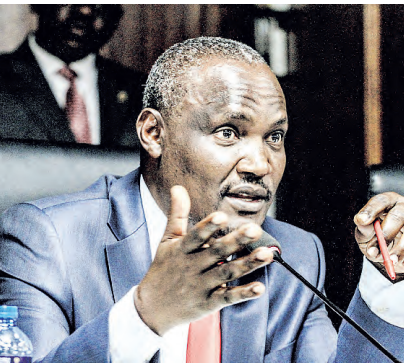
 National Treasury CS John Mbadi on September 24 last year /ENOS TECHE
National Treasury CS John Mbadi on September 24 last year /ENOS TECHE
More than 2.7 million people in the Lake Region Economic Bloc are set to benefit from a climate resilience project worth Sh4.7 billion ($36 million).
John Mbadi, National Treasury, Cabinet Secretary said the project will support smallholder farmers and producer cooperatives, who are among the most vulnerable to the adverse effects of climate change.
“The goal of the project is to promote climate-resilient and low-carbon practices in six value chains, including dairy, poultry, coffee, tea, fruit trees, and African leafy vegetables in the Lake Region Economic Bloc. Through the project, farmers will be trained and supported to adopt climate-smart technologies and practices for improved production, access to markets and increased incomes,” he said.
A delegation from the Kenyan government led by the CS participated in the signing ceremony of this project. In his remarks Mbadi noted that the agriculture sector in Kenya is highly vulnerable to the impacts of climate change.
He said; “While smallholders, including women and youth, and producer cooperatives may be the most vulnerable to the impacts of climate change, they are critical solutions and change actors to the challenges of climate change Kenya is facing.”
He added that the Kenyan government will fully support FAO's GCF program to build climate resilience in the Lake Region Economic Bloc's agricultural sector and fully committed to its complete and successful implementation.
Henry Gonzalez, Chief Investment Officer of the Green Climate Fund (GCF), said. ‘This project will support smallholder farmers in Kenya in protecting their livelihoods against climate risk. GCF’s investment will strengthen agricultural value chains and increase community resilience.’
The funding and subsidiary agreements were signed on the same day between GCF, FAO, and the Government of Kenya, accelerating implementation of a new climate-resilient agricultural project in the Lake Region Economic Bloc, Kenya.
The initiative, implemented in collaboration with the Government of Kenya, Agriterra, and the Government of Denmark, will provide more than 143,000 farmers with training and support to adopt climate-smart technologies and practices, strengthening their resilience to climate change and increasing their household incomes.
Since becoming partners in 2016, FAO and the GCF have been scaling up investments in high-impact projects that make the agriculture, forestry and fisheries sectors more efficient, inclusive, sustainable and resilient to climate change.











